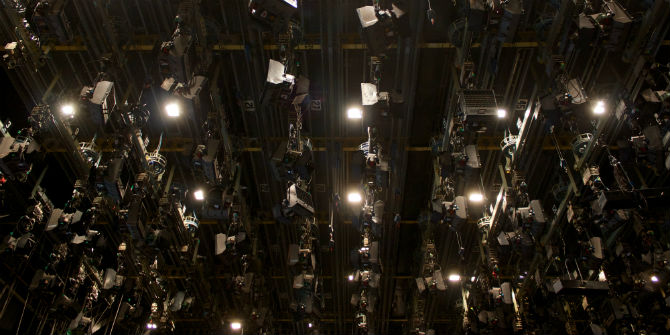 Recent years have brought about new challenges to media landscapes across Europe. Pressures from commercial broadcasters and declining audiences have been compounded by political and financial pressures that have led to questions about the very existence, role and purpose of public service broadcasting. An event held at the LSE last week addressed the future of public service media in Europe. One of the speakers, Peter Bajomi-Lazar of Budapest Business School, discusses here the challenges for public service broadcasting in the Western Balkans.
Recent years have brought about new challenges to media landscapes across Europe. Pressures from commercial broadcasters and declining audiences have been compounded by political and financial pressures that have led to questions about the very existence, role and purpose of public service broadcasting. An event held at the LSE last week addressed the future of public service media in Europe. One of the speakers, Peter Bajomi-Lazar of Budapest Business School, discusses here the challenges for public service broadcasting in the Western Balkans.
Public service television is a British invention that has been adopted in Europe in multiple successive waves. Its implementation is considered a success story in Northern Europe, but is widely seen as a failure in both Southern and South-East Europe, including in the Western Balkans. In most of these countries, public service broadcasters are either used for political ends or commercialised, or both, and fail to provide impartial news and quality programming. The attempt to introduce one element of the media systems of consolidated democracies in emerging democracies without regard to their historical legacies is not necessarily a recipe for success. This blog post looks at the former communist countries of the Western Balkans in an attempt to identify some of the reasons that make the implementation of genuine public service television a mission impossible in the region’s countries.
As a forthcoming volume of collected studies looking at Albania, Bosnia and Herzegovina, Croatia, Kosovo, Macedonia, Montenegro and Serbia reveals, public service television channels in the Western Balkans demonstrate a number of recurring patterns, including:
- Politicisation through the appointment of supervisory boards.
- Using public service broadcasters as a means of transferring public resources—such as well-paid positions and funds dedicated to programme production and advertising—to party clients.
- Pro-government bias on public service news bulletins.
- Commercialisation / the lack of high-quality programming output.
- Underfunding (with the exception of Albania and Croatia).
- The exposure of public service broadcasters to corporate pressures via advertising.
- Non-transparent and occasionally illicit financial management.
- Low audience ratings (with the exception of Montenegro and Serbia) and the resulting inability of public service media to enhance social integration and cohesion.
Why does public service television currently display largely similar flaws across the region?
The reasons are arguably rooted in the specific historical trajectories of these post-communist, and in some cases post-war, countries.
Some of these reasons are likely related to the economic conditions of the former communist countries. The United Kingdom and the Nordic countries distinguish themselves with high domestic income figures. By contrast, the transition economies of the Western Balkans are relatively poor. Even though public service television in these countries carries commercial advertisements, underfunding, a natural outcome of the region’s economic conditions, is difficult to overcome. Financial difficulties undermine the political independence of public service broadcasters and enhance the commercialisation of their programming.
Other reasons may lie in the political cultures of the region’s countries. Public service broadcasting is not only expected to enhance social integration and cohesion, but is also historically rooted in widely shared consensus. The political systems of both the UK and the Nordic countries have traditionally been based on an agreement shared by many groups constituting and representing society. By contrast, the transition societies of the Western Balkans are politically polarised and in some cases fragmented, and need to deal with ethnic, linguistic, cultural and religious cleavages. The interruption of democratic consolidation is a sign that these transition societies have no consensual visions about their future development. Some political parties overtly question, while others covertly undermine media pluralism in an effort to promote their ideologies and to marginalise those of their rivals. In consequence, the media often become a battlefield of conflicting views and ideologies rather than a forum for meaningful debate, and public service television finds itself in the midst of political conflicts. Ideally conceived to be a means of conflict management among different groups via dialogue, public service television has come to reflect, and possibly to enhance, conflicts. It not only mirrors but may also deepen the existing social, political, and ideological cleavages.
Other reasons may have to do with the journalistic cultures of the region’s countries. The concept and practice of neutrally objective journalism lies at the very heart of the British public service broadcasting model’s focus on editorial independence and political impartiality. However, in South-East Europe, foreign rule over many countries, including Ottoman, German, and Russian/Soviet occupation, has been conducive to the rise of cause-promoting journalism, as many journalists considered themselves public intellectuals with a duty to protect and to enhance national culture and identity, rather than independent and politically neutral observers. Hence, the literary tradition of journalism, including partisan and cause-promoting reporting, has deep roots in the region. In the countries of former Yugoslavia, this legacy is coupled with a memory of war propaganda, or ‘patriotic journalism,’ as sadly observed in the 1990s. Also, a lack of robust press markets coupled with a long tradition of direct political control over editors and journalists by party-states under communism, was unfavourable for the non-partisan model of journalism to emerge.
Yet other reasons may have to do with political institutions, and perhaps most importantly with parties and party systems. As noted elsewhere, political parties in the young democracies of Europe have fewer members and a lower level of public trust than those in the older ones. Electoral volatility is higher, party splits and mergers are more frequent, and parties switch ideologies more often. Many parties struggle with high levels of intra-party instability, low levels of party loyalty and discipline, and a lack of party institutionalisation. Parties in young democracies are necessarily younger, and have fewer resources for party building and organisation. As a result, many of them act as cartel parties and colonise the state and the media in an effort to cement their positions by exploiting the resources of these.
Public service television is no exception to this rule: parties delegate clients into well-paid positions, thus enabling them to influence strategic and managerial decisions, including the distribution of resources. Parties select their cadres on the basis of political rather than professional criteria; as a result, public media managers do not consider themselves ‘public servants’ but ‘party servants.’ As managers have a great influence on the nomination of the senior editorial personnel, they tend to appoint staff loyal to their party’s line. The institutional guarantees designed to protect the editorial independence and political impartiality of public service television do not work properly, as political parties have a key role in the implementation of regulation. Informal rules overwrite formal ones. Public resources such as programming and advertising funds are channelled via public service television to party clients in exchange for various services rendered to the same parties. Once again, the public service ideal is compromised.
None of the reasons that may explain the failed implementation of the public service ideal can be changed overnight — nor in a few decades, as the examples of public service broadcasting organisations in the slightly older democracies of Southern Europe suggest. For now, the implementation of a genuine model of public service television seems to be a mission impossible that needs to be reconsidered.
This post gives the views of the author and does not represent the position of the LSE Media Policy Project blog, nor of the London School of Economics and Political Science.





